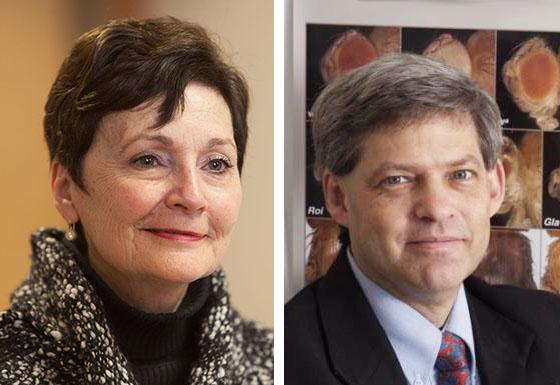PROVIDENCE, R.I. [Brown University] — Two Brown University professors will receive awards from the American Federation for Aging Research, recognizing their work on distinct aspects of growing older.
Terrie Fox Wetle, dean of the School of Public Health, earned the federation’s Irving S. Wright Award of Distinction. This award is named in honor of AFAR’s founder and recognizes exceptional contributions to basic or clinical research in the field of aging. Wetle studies end-of-life care, ethical issues in geriatrics, and promoting health of aging populations. In bestowing the award, AFAR recognized her for “leadership that significantly helped translate biomedical research into public health initiatives.”
When she receives the award Nov. 7, 2014, at the annual scientific meeting of the Gerontological Society of America, Wetle will also deliver a lecture.
“I am honored to receive an award named for Irving Wright who was not only an award-winning cardiovascular researcher, but who also had the foresight to launch a foundation to support basic research on aging,” Wetle said. “His research contributed to our understanding of anticoagulant therapies by translating basic science into clinical applications. In his memory, my Wright Award lecture will focus on translating research to improve health of older populations.”
Meanwhile, Dr. Stephen Helfand, professor of biology in the Department of Molecular Biology, Cellular Biology, and Biochemistry, will receive the Glenn/AFAR Breakthrough in Gerontology (BIG) Award, which AFAR says provides “timely support to a small number of research projects that are building on early discoveries that show translational potential for clinically-relevant strategies, treatments, and therapeutics addressing human aging and health span.”
Sponsored by The Glenn Foundation for Medical Research in collaboration with AFAR, two BIG Awards at $100,000 are given annually, selected through a review process led by committee members from leading research institutions nationwide.
Helfand said he will use the award for research he is conducting with John Sedivy on how DNA changes with age, sometimes liberating harmful “transposable elements” within our genomes. They are looking to reverse those age-related changes in repressive chromatin to suppress the expression and mobilization of transposable elements in order to extend healthy life span.

